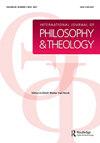The concepts of the sublime and the saturated phenomenon in Immanuel Kant and Jean-Luc Marion: a systematic comparison based on their philosophical origins
IF 0.3
0 PHILOSOPHY
International Journal of Philosophy and Theology
Pub Date : 2022-05-27
DOI:10.1080/21692327.2022.2127421
引用次数: 0
Abstract
ABSTRACT This paper is a systematic comparison between two well–known and theologically relevant concepts – the sublime as developed in Kant’s third Critique, and Marion’s saturated phenomenon. Although it discusses the significant and apparent similarities between them, it also criticizes Marion’s identification of the sublime as a possible example of a saturated phenomenon. This is primarily because of the different origins and philosophical presuppositions guiding the elaboration of these two ideas. Kant’s aim is to confine the reception of the phenomenon to the conditions of experience, so that both in the case of judg-ments of beauty and judg-ments of the sublime, the subject achieves pleasure through self-centred appreciation of its rational capacities. Marion’s saturated phenomenon, on the other hand, aims at dispensing with the ‘metaphysical’ horizon of either the object, or the transcendental subject, in favour of passive appropriation of givenness. Although both are meant to describe what happens when the limits of understanding are breached, in the sublime this breach only serves to reinforce the capacity of the rational subject, whereas in the saturated phenomenon it points to the possibility of apprehension of the totally Other as purely given.康德与马里恩的崇高概念与饱和现象:基于哲学渊源的系统比较
摘要本文系统地比较了康德第三次批判中提出的崇高和马里昂的饱和现象这两个著名的神学相关概念。尽管它讨论了它们之间显著而明显的相似之处,但它也批评了马里昂将崇高视为饱和现象的可能例子。这主要是因为指导这两种思想阐述的不同起源和哲学预设。康德的目的是将对现象的接受限制在经验的条件下,这样,无论是在对美的判断还是对崇高的判断中,主体都通过以自我为中心的对其理性能力的欣赏来获得快乐。另一方面,马里昂的饱和现象旨在摒弃对象或先验主体的“形而上学”视野,而倾向于被动挪用给予性。尽管两者都是为了描述当理解的极限被突破时会发生什么,但在崇高中,这种突破只会加强理性主体的能力,而在饱和现象中,它指向了对纯粹给定的完全他者的理解的可能性。
本文章由计算机程序翻译,如有差异,请以英文原文为准。
求助全文
约1分钟内获得全文
求助全文
来源期刊

International Journal of Philosophy and Theology
PHILOSOPHY-
CiteScore
0.30
自引率
0.00%
发文量
12
期刊介绍:
International Journal of Philosophy and Theology publishes scholarly articles and reviews that concern the intersection between philosophy and theology. It aims to stimulate the creative discussion between various traditions, for example the analytical and the continental traditions. Articles should exhibit high-level scholarship but should be readable for those coming from other philosophical traditions. Fields of interest are: philosophy, especially philosophy of religion, metaphysics, and philosophical ethics, and systematic theology, for example fundamental theology, dogmatic and moral theology. Contributions focusing on the history of these disciplines are also welcome, especially when they are relevant to contemporary discussions.
 求助内容:
求助内容: 应助结果提醒方式:
应助结果提醒方式:


